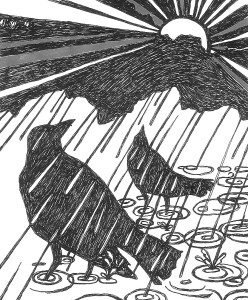Gateway Showdown Might Dwarf Idle No More

extracts from an article by Will Braun (Mar. 4, 2013)
Chief Theresa Spence is back home in Attawapiskat and Idle No More has faded from view after an impressive run in the headlines. Another aboriginal movement, however, continues to build toward the biggest First Nations stand-off in a generation: the fight against the proposed Northern Gateway Pipeline.
The contentious project—a 1,170-kilometre pipeline that would link the Alberta oil sands with a supertanker port in Kitimat, B.C.—is a major economic and environmental issue. But it also represents the most significant degree of aboriginal resistance this country has seen since 1990 when Mohawk warriors stared down Her Majesty’s Royal 22nd Regiment across barricades at Oka.
Like Idle No More, the pipeline battle is a gut-level expression of aboriginal determination. Unlike Idle No More, it is tightly organized and well-defined, with proven staying power and a simple focus: to prevent construction of the $6.5-billion project.
Aboriginal opposition to Gateway is centred in twenty or so relatively small First Nations between Prince George, B.C., and Haida Gwaii (the Queen Charlotte Islands). Their primary concerns are the risk of an oil spill into a treasured salmon river or a supertanker accident along the coast. A major accident, they say, could have catastrophic and possibly irreparable effects on aboriginal culture and identity.
The harvesting and use of salmon, and other wild foods, are essential parts of the economy, diet, and culture for First Nations in the area. This tangible, immediate, and deep connection to the lands and waters is closely related to the degree of resolve among First Nations opposing Gateway. Russell Ross Jr., a Haisla councillor, says opposition is unanimous among the roughly 800 Haisla residents of Kitamaat Village.
The big question now is whether Enbridge will stay the course, and if so, whether Ottawa will approve the project. Will Gateway proceed to the point of open confrontation with First Nations?
Officially, the project is still on track. If that doesn’t change, Ottawa will be faced with the prospect of fighting numerous First Nations in court — First Nations that have not signed treaties or otherwise ceded their lands, which gives them a stronger legal leg to stand on. Ottawa will also face the prospect of arresting dozens of respected and articulate aboriginal leaders and elders, along with many more community members, as the world looks on.
It may not come to this. The project may be quietly shelved at some point. But if Ottawa and Enbridge do not relent, Canada may face a defining moment in terms of aboriginal relations.
The question Northern Gateway presents is not only whether Canada should build its future, in part, with the proceeds of bitumen exports, but whether a federal resource development plan that steamrolls First Nations who oppose projects is tenable.

